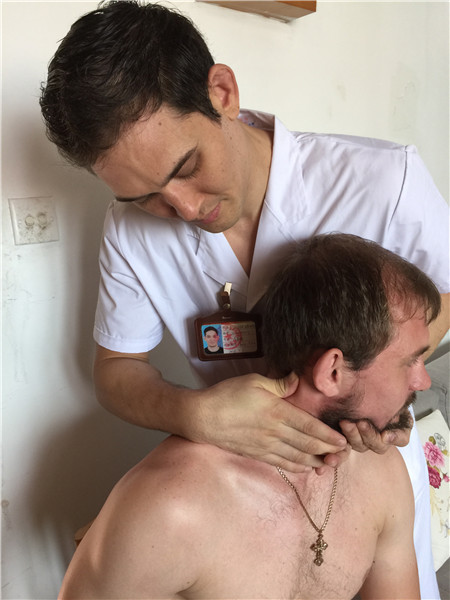Sportsman finds magic in traditional medicine
 |
|
Julien Vandelli treats a sportsman from Russia suffering from neck pain at the university's affiliated hospital on Sept 22, stretching his muscles with tui na, medical massage. [Photo provided to China Daily] |
French sportsman Julien Vandelli didn't foresee that he would spend five years reading the abstruse ancient Chinese medical text Huangdi Neijing in a Chinese university, where he practices acupuncture and medical massage.
However, the life-changing decision to become a traditional Chinese medicine practitioner came when the 34-year-old man saw the "magic" that TCM brought to his mother's shoulder injury.
Vandelli's mother had a badly hurt shoulder and Western medical treatments such as vitamin injections and anti-inflammatory drugs could stop the pain but not the process of degradation. When the drugs' effects went away, the pain came back and became even worse.
Luckily, his mother was introduced to an acupuncturist in Switzerland who cured the "root cause" of the pain by pricking several fine needles into the shoulder.
"As a sports practitioner, I used to get a lot of injuries. Obviously it costs a lot of money and time to go to see a doctor in the hospital. I wanted to understand myself better and learn to treat myself naturally," Vandelli said.
Vandelli's mother told him that acupuncture is good in treating sports injuries, and that triggered the sportsman's interest in coming to China to study TCM.
Vandelli is among the increasing number of foreign students who have come to study at the Guangzhou University of Chinese Medicine.
There are currently 2,382 international students studying at the university, from 37 countries and regions around the globe. The number of students has seen an average growth of 10 percent year over year.
About 1,700 international students are taking a five-year course with a bachelor's degree like Vandelli, and there are also a large number of international students taking shorter courses for several weeks at the university like Maria Alexandrino from Portugal.
Alexandrino, 45, has worked as a microbiology researcher for 17 years, mainly in Germany, and she began taking TCM classes during weekends and holidays five years ago, getting interested by the time-honored medical science after learning kung fu and reading Huaidi Neijing.
Having just finished the three-week practice at the Guangzhou-based university's affiliated hospital, Alexandrino will return to Germany and finish the remaining courses in Western medicine.
In Germany, in order to be allowed to practice Chinese medicine, Alexandrino has to study Western medicine for two years and pass a test in front of a panel of doctors assigned by the government.
"The government wants to ensure that I can recognize any kind of emergency. Western medicine is better at handling emergencies, such as organic trauma, big wounds and heart attacks because Western medicine was developed during wars," she said.
"But Chinese medicine is superior in another kinds of diseases that have increased a lot in Western countries, that is, subclinical-level diseases."
"In Western countries, the average state of health is very good. There are almost no infectious diseases because of vaccines and antibiotics. But the subclinical-level diseases have caused a lot of problems to patients and cannot be well treated by Western medicine."
For example, a patient may tell the doctor that he or she has a headache but nothing wrong is shown in the brain's CT scan. So a Western doctor can only prescribe painkillers and after two or three years, the patient will not only have a headache but also a bad stomach because of the painkiller's side effects, Alexandrino said.
"Headache, depression, neck pain and back pain are actually caused by anxiety and pressure most of the time. Chinese medicine is superior because the treatment has no side effects and it also can treat both the symptoms and the root cause if well done," she said.
Vandelli also sees bright prospects for TCM in Western countries. He said that he treated six patients a day with massage and acupuncture during his winter holiday in France, most of whom were his friends and his parents' friends.
"People are more and more interested in Chinese medicine because they see them as mostly natural, especially the older generation. In Nice, southern France, where I come from, there are a lot of rich, retired people who don't want to spend the rest of their life taking pills," he said.
Sportsman finds magic in traditional medicine
Vandelli started the practice at the affiliated hospital of Guangzhou University of Chinese Medicine this year and plans to stay in the university to pursue a master's degree after finishing the five-year study.
He said that five years are not enough to have a thorough grasp of TCM, in which a practitioner needs years of experience to make quick, precise diagnoses.
"My ultimate goal is to go back to my country to open an academy for martial arts, next to which there is a clinic where I can treat people's sports injuries or other postural imbalances caused in daily life with Chinese medicine and therapies," he said.
"Before that, I want to stay in China for a longer time to learn more about Chinese language and culture, which will help me better understand Chinese medicine," he added.


















